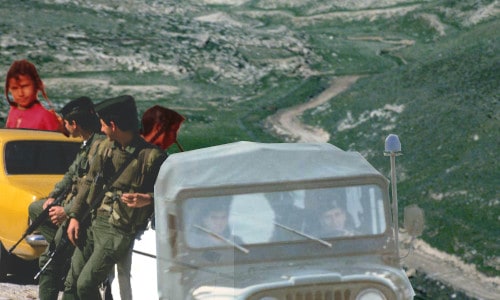Why I am no longer pro-Israel, nor pro-Arab, but pro-human.
The story about a Canadian Evangelical and apocalyptic Christian studying in Israel. How reality confronted imagination and stereotypes and won.
As my wife and I unbuckled our seatbelts on El-Al airliner and looked out the window, our imaginations ran wild. Little did we know the emotional and intellectual challenges that lay ahead.
We were on a one-year scholarship to attend the Hebrew University of Jerusalem in 1984. The stay in Israel was after three years of Bible College training. It was exciting to live and study in the actual place where most of the Biblical writings took place.
Like many other Bible-believing Christians, my mind stopped at 33 AD, full of antiquated stereotypes and assumptions about modern Israel. Before the trip began, there was no knowledge of what Israel geographically looked like, nor was personally familiar with anyone of Jewish heritage, and entirely ignorant of contemporary Middle East affairs. I was ideologically a Christian Zionist — a person who supported the State of Israel because of the numerous historical and apocalyptic references to this nation found in the Bible. The Arab community hardly figured into this initial picture.
The change of perceptions was not an immediate one, but bits and pieces of small sightings and events. It all came together one morning.
While filling in time at the entrance of Jerusalem Christian Assembly Church1 before the doors opened, I started small talk with a man who called himself Brother David. “Did you hear about the Arab riot?” This was in regards to a violent riot in Bethlehem that had ended with military intervention the day before. He replied with a sudden look of happiness and emphatically stated, “soon, they won’t be with us anymore.” His words alluded to an assumption many evangelical circles hold that any opposition to the modern State of Israel is God’s enemy and pre-ordained for destruction.
It was later learned that Brother David was living on the Mount of Olives as part of a controversial christian group called the House of Prayer. They were waiting, praying, and encouraging the end of the world to come.
When he verbalized these beliefs, it shocked and deeply troubled by what those words realistically meant. In Canada, these similar thoughts were a combination of my active imagination, a heavy dose of apocalyptic literature, and over-simplification. Israel is thousands of miles away. The black and white belief of a righteous Israel with unrighteous enemies poised to destroy the chosen people never seemed to hurt anyone.
To hear these same thoughts out loud created a moral dilemma. When these ideas were lifted out of religious imagination and placed into reality, they were causation for serious harm. It is hard to imagine saying to an Arab that his opposition to Israeli policies is a foretold doom and thus already write him off. Nor could I remain callous when an Israeli edict demolished their homes or see a Palestinian child sleep alone under a desolate tree and look the other way and do nothing. It also felt inhumane to catch a glimpse of an Arab family living in poverty and not care because “soon they are going to be gone anyways”. My humanity cried out for justice and fairness. Instead, my beliefs were fostering injustice, hatred, and prejudice.
Looking out the window of the transit bus on my daily excursions and seeing both Israelis and Arabs going about the regular busyness of their days, my apocalyptic anticipations became quieter. Perhaps the end is coming, and the formation of the State of Israel and the opposition against them are definite signs, but the fulfillment of prophecy is God’s job, not mine or anyone else. To do it myself or encourage other people, parties, or Governments to follow such thinking invites many to freely perform criminal acts, to engage in hate, ignorance, physical and social harm. There are misplaced priorities where the cost of human life and the related quality of life, especially one of an Arab or Palestinian, is almost viewed as a necessary sacrifice, or ignored, in light of this zeal.
Having been surrounded by an Arab populace challenged my preconceptions. These were real people. It forced me to change, and I wondered about myself and evangelicals as a whole. How have we gotten this so wrong?
This was a hard topic to work through and likely one of the biggest lessons I learned while hitchhiking and busing in Israel. The discovery that one of the greatest sins is the person or society convinced they are doing and propagating a good, such as those trying to manufacture events to encourage the fulfillment of perceived end-time prophecies, but instead are bearers of ignorance, hatred, and injustice.
Hopefully, the Evangelical Church will soon take a more humane and neutral position. It would be a factor in bringing resolution to the Arab–Israeli conflict.
